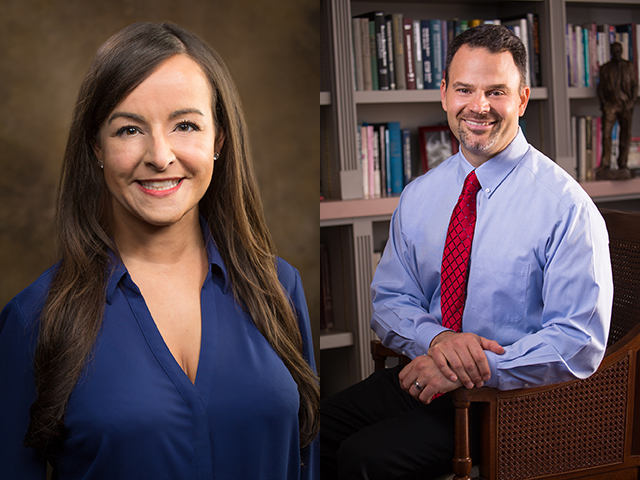FAYETTEVILLE, Ark. – A new report, "Modern Sexism and the 2016 Presidential Election,” by Angie Maxwell and Todd Shields of the University of Arkansas, analyzes American attitudes toward working women and feminism, along with the impact of those attitudes on last year’s presidential race.
The Diane D. Blair Center of Southern Politics and Society in the University of Arkansas’ J. William Fulbright College of Arts and Sciences released the report Wednesday, June 7, as the second in series of reports based on the 2016 Blair Center Poll.
The full report is available on the Blair Center website.
Specifically, in the report Maxwell and Shields utilize a well-tested series of questions from the “Modern Sexism” scale, which explores respondents’ resentment or distrust of women in the workplace, rather than using traditional measures of whether or not respondents believe a woman to be capable of professional success.
“Most Americans would not say that women are innately less capable or qualified than men,” said Maxwell, director of the Blair Center and associate professor of political science. “But, there is a measurable hostility — reported by many men and women — toward working women, or a tendency for them to be disliked, that does impact women running for office.”
The report also examines these attitudes along racial, gender, regional and partisan divides, offering a wealth of information about both the primary and caucus elections, as well as the general election, while making a strong case for the inclusion of such measures in future research on voting behavior.
“We explored this concept in our 2012 poll as well,” said Shields, dean of the Fulbright College and professor of political science. “And the candidacies of both Jill Stein and Hillary Clinton gave us an opportunity to measure the effect of these attitudes on female candidates vying for the nation’s highest office — and the effect is undeniable.”
Shields is the co-author of The Persuadable Voter: Wedge Issues in Presidential Campaigns, winner of the Robert E. Lane Award for best book in political psychology.
Maxwell holds the Diane Blair Endowed Chair in Southern Studies and is the author of The Indicted South: Public Criticism, Southern Inferiority, and the Politics of Whiteness, winner of the V. O. Key Award for best book in southern politics.
Maxwell said the Blair Center Poll is a comprehensive, post-election, national survey that includes oversamples of African Americans, Latino(as), and people living in the former states of the Confederate South, along with its representative national sample of the American people.
The poll is the only rigorous academic survey with a specific focus on this region and these communities that are often underrepresented in public opinion research, Maxwell noted.
About the J. William Fulbright College of Arts and Sciences: The J. William Fulbright College of Arts and Sciences is the largest and most academically diverse unit on campus with 19 departments and 43 academic programs and research centers. The college provides the core curriculum for all University of Arkansas students and is named for J. William Fulbright, former university president and longtime U.S. senator.
About the University of Arkansas: The University of Arkansas provides an internationally competitive education for undergraduate and graduate students in more than 200 academic programs. Founded in 1871, the University of Arkansas comprises 10 colleges and schools and maintains a low student-to-faculty ratio that promotes personal attention and close mentoring.
Topics
Contacts
Angie Maxwell, director
Diane D. Blair Center of Southern Politics and Society
479-575-6007,
Andra Parrish Liwag, development writer
Fulbright College of Arts and Sciences
479-575-4393,
